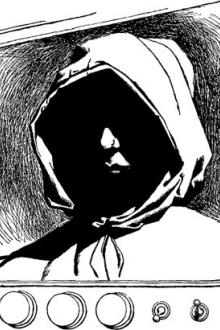Hurst - Robin Crumby (bookreader TXT) 📗

- Author: Robin Crumby
- Performer: -
Book online «Hurst - Robin Crumby (bookreader TXT) 📗». Author Robin Crumby
“My good friend, Jack. Welcome, welcome. How are you? And here we have Sam, I think. You are well too, I hope? What have you brought me today? Come, sit, have some coffee, relax.”
Jack took a seat opposite Anders and helped himself to freshly brewed coffee from a large metal pot. Proper coffee, thought Jack to himself. Anders always had the best of everything.
Anders’ second in command sat arms crossed, watching Jack as he inhaled the delicious aroma of freshly roasted coffee with his eyes closed, savouring every second. When Jack looked up from his moment of indulgence, the man opposite held his gaze and nodded slightly, acknowledging Jack’s gratitude for the simple pleasure of a good cup of coffee. Standing over by the bookshelves, Sam held back from the others and perched nervously on the side of a trestle table erected next to the wall, watching the three men carefully, listening intently to their conversation from a respectful distance.
“I think you remember Victor, my first officer,” said Anders. “He just came back from Portsmouth. You made many new friends, I think, yes?” he said, nudging his first officer.
Victor nodded and smiled, revealing a gold tooth. He leaned forward and grabbed a shortbread biscuit, snapping one ostentatiously between his teeth. “Perhaps,” he replied enigmatically, raising his eyebrows and waving the remaining half of the biscuit in small circles, his mouth still full.
Jack thought Victor looked rather pleased with himself.
“We have, how do you say…?” Victor paused, considering for a second, “established lines of communication.”
He was most likely Polish or Latvian, Jack wasn’t sure, he couldn’t place the heavily accented English, other than somewhere in Eastern Europe.
Anders took over the story, his patience with Victor’s amateur dramatics exhausted.
“We are talking with the Royal Navy in Portsmouth. Or rather, what’s left of them. Out of seventeen thousand personnel, there are less than four hundred still there, holed up like rats in the old naval dockyard. It would seem that all their weapons and fences and ships couldn’t keep the virus out. Victor here met with their leader, Captain Armstrong. He is someone we can do business with, I think.”
“And what news from anywhere else? Are they in contact with other groups?” asked Jack hopefully.
“He did not say,” said Victor curtly with a dismissive wave. “I did not ask. We were too busy talking about other things.” Victor leaned back in his seat, looking relaxed and smug, like the cat that got the cream.
Anders took over again. “You tease them too much, Victor. Look, we have something, maybe, you might be interested in, Jack. Something good. You want a look?”
Jack looked intrigued and nodded. They rose as a group and Jack and Sam followed the other two men down a narrow corridor, under strip lighting that flickered from time to time. They entered a larger hold below the main deck. In boxed wooden crates, their lids already crowbarred open, lay what looked like rifles secured in grey cut-out foam to protect them in transit.
Anders reached in and lifted one out. Turning it over to inspect the sights and stock, he pulled back the firing pin and inspected the empty chamber. Jack recognised them instantly from his time in the service. They were standard-issue SA80s used throughout the British military. What he wouldn’t give for a few of those for the guys back at the castle, rather than farmers’ shotguns and barely functioning museum pieces.
“We also have ammunition, 9mm pistols, grenades and this beauty.” He reached down and patted a larger tripod mounted machine gun, with boxes of ammunition stacked next to it. “Quite a haul, yes?” Anders looked incredibly pleased with himself.
“Impressive, Anders. How much did that little lot cost you?” asked Jack.
“A pretty penny. But worth it. Your Royal Navy was very willing to trade. It took a bit of persuasion of course, but they have hundreds and hundreds of weapons and no one left to fire them. They are as useless as ice cream to an Eskimo. Is that the expression? Or coals to Newcastle, I like better. Meanwhile they have no, shall we say, creature comforts. Food, yes, but hardly any cigarettes, drink, and certainly no recreational drugs. What can I say? The captain likes his Russian vodka. We let him have half a dozen cases, for now. And enough pills to make them forget all about the virus.”
Jack eyed the merchandise greedily, stroking his chin thoughtfully. “But, Anders, we both know he doesn’t have what I have. Fresh vegetables, bread baked this morning, home-grown apples picked yesterday from our orchard. Very hard to come by. I have your usual delivery if your men can give me a hand. In exchange for, shall we say, five of those rifles and a couple of pistols? We’ll take as much ammunition as you can spare.”
Anders wagged his finger. “Well, it is true, we are very fond of Hurst potatoes and cabbage. Not so much the carrots, too sweet. Makes a change from tinned vegetables. Keeps us healthy, no?” He laughed, stroking his paunch. “We grow fat and lazy here. Not like you, Jack. While you work, we have little to do here but eat and drink all day long. It is very tiresome.” He chortled at his own joke and considered Jack’s proposal, moving his head from side to side. “But as you and me we are old friends, why don’t we say three rifles, two pistols and bullets for both? When you bring me more, we can trade again. There are plenty more where these came from. And our new friends at the Royal Navy have unlimited stores to equip a whole army. I’m sure if we asked nicely we could get you a helicopter, perhaps. He has a whole store of engine parts and electrical spares. You name it. Victor has seen it. They have a set-up to die for. They have a hospital, accommodation for hundreds, fences and soldiers to keep them safe, cooks and kitchens. It is sanctuary, my friend. They could take all of us.”
“So why are you still here, Anders? Why did Victor come back? Sounds like you found something better. A way out of all this. A return to normality. A new start.”
“Because…” Anders paused, wagging his finger at Jack. “I do not trust him. And besides,” he went on, stretching both arms wide, looking around him, “how could I leave the Charlotte? This is my home.”
Jack drained his cup and nodded. He knew exactly what Anders meant. He felt the same way about Hurst. It would take something special to make him leave his adopted home.
Chapter ElevenJack and Sam unloaded the share of their cargo that belonged to Anders in return for the rifles, boxes of ammunition and a few other assorted items, including personal gifts from Anders.
It was Anders’ “thing”, an indulgent and entirely sentimental act he always undertook when he knew Jack was coming. He took great care in selecting some toys for the Hurst children, whom he knew by name. Boxed Transformers for the boys, Toy Story figurines for the girls. He normally added a couple of bottles of vodka and cigarettes for the grown-ups.
Jack shook hands with Anders, the two of them standing on the bottom step of the stairway exchanging warm farewells. Sam uncleated the bowline and left it on a slip, ready to cast off as soon as Jack was back on board. There was a strong swell running that made the Nipper’s gunwale rise and fall two metres as each wave surged past. The small fishing boat yawed from side to side, making the jump treacherous.
Jack stood poised on the narrow platform, waiting for the optimum moment to step aboard. When the Nipper rose on an approaching wave, he balanced gracefully on the raised gunwale and jumped the last few feet to the deck next to some fishing nets. Sam cast off the stern and raced the length of the boat to do the same at the bow. They drifted back along the towering hull of the Charlotte, angling away and heading west, onwards on the last leg of their journey.
Their final destination on this morning’s excursion was Spitbank and No Man’s Land forts. The two forts, passive sentinels for some one hundred and fifty years, stood guard over the shipping lanes at the eastern end of the Solent. They were both accessible by boat from the mainland via Gosport and Portsmouth, or from the island via Ryde. Together with Hurst and the other Solent forts, they made up a formidable chain of castles, forts and shore batteries constructed during Napoleonic times to defend Portsmouth against the threat of invasion by the French. The fortifications had made this stretch of English coastline one of the most heavily defended in the world. In the end, the forts had fallen victim not to attack but to the advance of naval weaponry. Modern, longer-range cannon, not to mention the advent of peace, had combined to ensure the forts' obsolescence, soon after completion.
Today, the forts stood isolated and windswept. Yet they had lost nothing of their imposing grandeur.
Like Hurst, the inaccessibility of Spitbank and No Man’s Land was both a tonic and a boon to the survivor groups that occupied them. On one hand, the forts provided a sanctuary from the chaos and disorder that had befallen towns and villages on the mainland. On the other, their inaccessibility was a curse.
It was said that the occupants of the forts had watched the events on the mainland unfold with a strange detachment. Huddled round their single working radio set, they listened to the news reports of spreading sickness and widespread rioting from the relative safety of the forts. It reminded the older members of the group of the Blitz, so many years before. They shook their heads with growing concern until, several days later, all live broadcasts ceased transmission. Looped public safety announcements were all that remained, telling people to stay indoors. When the power grid failed, all they heard was white noise.
Fuel for the forts' generators ran dangerously low, and was held in reserve for winter. When the oil ran out, they became wholly dependent on scavenging trips for fuel and food. Their first choice was to head to the island where the lower population density made things a little safer. Scavenging trips to Portsmouth and Gosport were more lucrative but considered too dangerous. The forts’ occupancy numbers had dwindled as supplies grew increasingly scarce, driving many away. Today, only a small group could be sustained at both sites, of some twenty or thirty souls each.
Jack stopped first at No Man’s Land and stood on the Nipper’s foredeck exchanging pleasantries with Shannon, a fisherman’s widow and formerly a café owner from Cowes before the breakdown.
Sam secured the large lifting hook from the pulley to hoist the last of the sacks while a young man above directed proceedings. Sam held the sack steady on the first part of its ascent as it swung out over the water in the light breeze.
A grey foam clung to the lower rungs of the ladder. Waves lapped rhythmically against the base of the fort, alternately exposing and covering the green and brown seaweed that clung to the stone. When the last of the sacks was lifted off the deck, they lowered two large fuel drums full of diesel and a small Kawasaki portable generator being offered in exchange before casting off. Jack steered the Nipper the short distance





Comments (0)